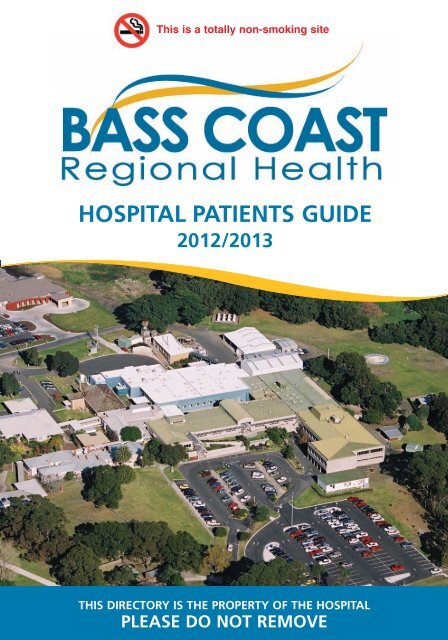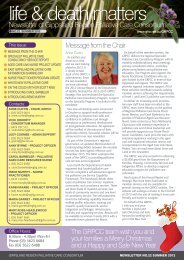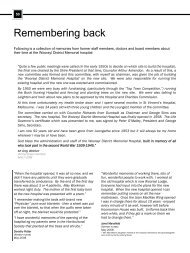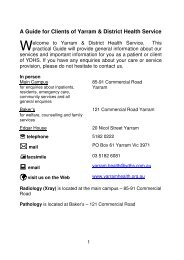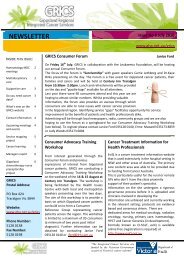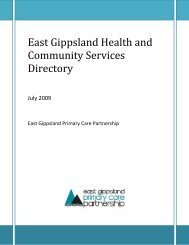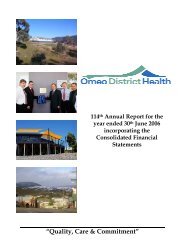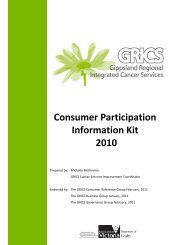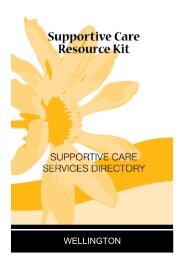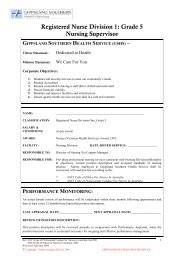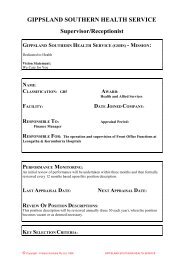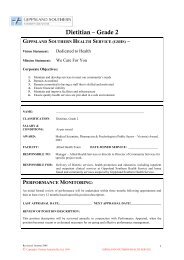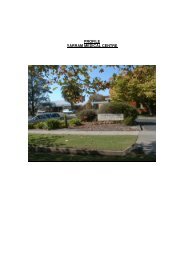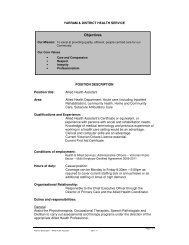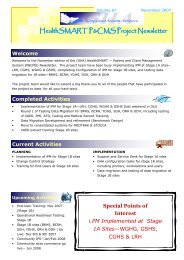HOSPITAL PATIENTS GUIDE
HOSPITAL PATIENTS GUIDE
HOSPITAL PATIENTS GUIDE
Create successful ePaper yourself
Turn your PDF publications into a flip-book with our unique Google optimized e-Paper software.
This is a totally non-smoking site<br />
<strong>HOSPITAL</strong> <strong>PATIENTS</strong> <strong>GUIDE</strong><br />
2012/2013<br />
THIS DIRECTORY IS THE PROPERTY OF THE <strong>HOSPITAL</strong><br />
PLEASE DO NOT REMOVE
PATIENT INFORMATION<br />
WELCOME TO BASS COAST REGIONAL HEALTH -<br />
WONTHAGGI <strong>HOSPITAL</strong>.<br />
The Wonthaggi Hospital, as part of Bass Coast Regional Health, is staffed by a committed team of<br />
dedicated people who understand that being a patient in hospital can often be an anxious time for<br />
you, your carer, family and friends.<br />
This booklet aims at assisting you to understand the information and services you may expect during<br />
your stay. Please feel free to ask members of our staff if you have any questions or require further<br />
information.<br />
VISION<br />
Striving to achieve excellence in health care for the Gippsland South Coast.<br />
PURPOSE<br />
To plan and develop a sub regional health service that meets the primary health needs of the local<br />
community in addition to providing secondary and specialist care to the extended population of the<br />
South Coast. We are committed to work with our partners to achieve appropriate sub regional<br />
access to specialist services for the people of the South Coast.<br />
VALUES<br />
A set of values will underpin our strategic direction and our relationships with the community and<br />
our health partners:<br />
• Person Centred Focus<br />
• Integrity<br />
• Trust<br />
• Respect<br />
• Quality and Safety<br />
• Accountability<br />
• Working Together<br />
Bass Coast Regional Health, Wonthaggi 2012/5379<br />
1
PATIENT INFORMATION<br />
Wonthaggi Hospital was founded in 1910 and services the Bass Coast Shire, an area of over 860<br />
square kilometres and with a permanent population of over 30,000. The Health Service provides a<br />
comprehensive range of services including acute and sub-acute hospital services, aged residential<br />
care, community health services and a range of ancillary medical services.<br />
The Health Service is fully accredited by the Australian Council on Healthcare Standards (ACHS) and<br />
equipped to offer a broad range of specialist medical, surgical and obstetric services including<br />
orthopaedics, ophthalmology, gynaecology, paediatrics, ear nose & throat surgery, gastrocolic<br />
surgery, urology, general surgery, Geriatric Evaluation and Management program, and slow stream<br />
rehabilitation.<br />
Aged residential care services are provided in the 30-bed Armitage House Nursing Home, 30-bed<br />
Kirrak House Nursing Home both in Wonthaggi, and 29-bed Griffiths Point Lodge Hostel at San<br />
Remo. All aged residential care services are accredited through the Aged Care Standards and<br />
Accreditation Agency, and ACHS.<br />
A wide range of community-based services are provided from sites at Wonthaggi, Inverloch,<br />
Grantville, Corinella and Cowes. The Health Service also provides Meals on Wheels to all of the Bass<br />
Coast Shire community, comprehensive training programs for its staff and the community including<br />
apprenticeships, public health programs, and clinical placement programs for medical, nursing and<br />
allied health trainees.<br />
Interpreter services may be organised in advance to facilitate care requirements such as elective<br />
admission, and procedural consent.<br />
Lea Pope<br />
Chief Executive Officer<br />
Bass Coast Regional Health<br />
2
PATIENT INFORMATION<br />
What To Bring To Hospital<br />
• Medicare Card<br />
• Pharmaceutical Benefits Scheme entitlement<br />
card (if relevant)<br />
• Concession, Healthcare, Safety Net<br />
• DVA / Pension Card<br />
• Private Health Insurance details (if applicable)<br />
• Any documentation that the doctor has given<br />
you for example:<br />
- Medication Chart<br />
- Operation Consent form (if not already<br />
given at booking in)<br />
- Anaesthetic Information<br />
- X-rays<br />
- Letter / instructions<br />
If you are staying overnight:<br />
• Nightdress / pyjamas, dressing gown, and<br />
well fitting slippers<br />
• Toiletries<br />
• Small change (for newspapers and phone<br />
calls)<br />
• Phone cards can be purchased at the<br />
Administration office in the foyer for bedside<br />
telephones, or there is a public telephone in<br />
the foyer.<br />
Note: Private electrical appliances will be subject<br />
to a safety check (by the hospital) prior to use in<br />
the hospital.<br />
Valuables<br />
Please avoid bringing valuables (including<br />
watches, jewellery, etc.) or large amounts of cash<br />
into the hospital, as the Health Service does not<br />
accept responsibility for such items.<br />
If you have brought valuables in with you, they<br />
may be signed over to the staff and maintained<br />
in the safe. You will be given a receipt for the<br />
valuables to be used at the time collection.<br />
Collection of valuables can only be undertaken<br />
during office hours. If amounts of money over<br />
$50 have been signed over to the Health Service,<br />
at least one (1) business day’s notice is required<br />
to retrieve these, as cash is not kept on the<br />
premises. This arrangement is to be made via<br />
General Administration on (03) 5671 3333.<br />
ADMISSION / DISCHARGE /<br />
TRANSFER<br />
Maternity<br />
Maternity patients will need to book in at the<br />
hospital as early as possible prior to the expected<br />
birth date. Women need to have chosen their<br />
doctor from the Wonthaggi Medical Group and<br />
consulted with that doctor. Women should<br />
telephone the main reception at the hospital to<br />
book an appointment with a midwife who will<br />
discuss individual pregnancy care plans.<br />
Patient Classification<br />
Bass Coast Regional Health is a public hospital,<br />
and on admission you will be classified as one of<br />
the following care types:<br />
• Public patient (Medicare)<br />
• Private patient<br />
• Compensable patient (Workcover or TAC –<br />
claim number required)<br />
• Veterans' Affairs<br />
• Overseas patient from countries without<br />
reciprocal healthcare. Patients not covered by<br />
Medicare will be charged fees to achieve full<br />
cost recovery.<br />
3
PATIENT INFORMATION<br />
Patients with private health insurance have the<br />
choice to be treated as either a public or private<br />
patient – unless you have agreed with your<br />
surgeon to have you procedure as a private<br />
patient. We encourage you to use your private<br />
insurance if you have it because by doing so you<br />
are assisting the Health Service to maintain<br />
provision of the best care and facilities for the<br />
community we serve.<br />
If you elect to be a private patient please ensure<br />
that your health fund membership is up to date,<br />
covers your admitted procedure (if surgical), and<br />
that you have your membership card/book or<br />
details with you. It is your responsibility to be<br />
aware of your level of cover and to ensure that<br />
your membership is current.<br />
Transfer to Another Facility<br />
Sometimes it is necessary to transfer patients to<br />
another hospital, nursing home or healthcare<br />
facility. This is only done in consultation with you<br />
and your carer/family, or in emergency situations.<br />
Transfer may be by air or road ambulance, or<br />
hospital/volunteer transport service.<br />
Please check that any follow up appointments<br />
have been made and that your medication<br />
requirements have been arranged prior to<br />
discharge – refer to medication heading.<br />
Discharges normally occur before 10.00 am. If<br />
you are having a day procedure you will be<br />
discharged on the same day. You must make<br />
arrangements for someone to drive you home, as<br />
legally you are not able to drive a motorised<br />
vehicle for a minimum of 24 hours post<br />
anaesthetic. It is recommended that you have<br />
someone stay with you overnight for this postanaesthetic<br />
period.<br />
Discharge at Own Risk<br />
With few exceptions (for example in case of<br />
infectious diseases) you have the right to leave<br />
hospital when you choose. This may be a serious<br />
step when taken against the advice of your<br />
doctor and could pose a significant threat to your<br />
well-being. If you choose to be discharged under<br />
these circumstances you will be asked to sign a<br />
disclaimer form and the responsibility for this<br />
action will rest with you.<br />
Discharge<br />
Management of your treatment may continue<br />
after you leave hospital and return home. Before<br />
you are discharged the hospital will make sure<br />
that you and the relatives or friends involved in<br />
your care know how to look after you at home,<br />
and understand what is involved. Please do not<br />
hesitate to ask for treatment programs to be<br />
written out for you if you have any doubts. Your<br />
doctor or nurse will answer any questions you<br />
may have and will arrange necessary support<br />
services such as District Nursing, personal care,<br />
rehabilitation, Meals on Wheels, or Home Help.<br />
4
PATIENT INFORMATION<br />
MEDICATIONS<br />
Current Medication<br />
To help the Doctor and Pharmacist check that the<br />
right medications are given to you while in<br />
hospital, please bring all your medications from<br />
home with you. Sometimes, the medications<br />
given to you in hospital may look different to the<br />
ones used at home as the hospital may keep a<br />
different brand of medication. Your own<br />
medication, such as inhalers and eye drops may<br />
also be used if the hospital does not have these<br />
available, so please ensure you bring them with you.<br />
While in hospital, a Pharmacist may visit you to<br />
review your medications. It is important you tell<br />
the Pharmacist all the medications you take<br />
(including non-prescription and herbal<br />
medications) and any allergies or sensitivities you<br />
have to medications.<br />
The Pharmacist will help the Doctor to give you<br />
the best medication treatment available and can<br />
explain any changes to your medications that<br />
may have been made by the Doctor. The<br />
Pharmacist can also answer any questions you<br />
may have about your medications. If you would<br />
like any additional information about your<br />
medications such as a Consumer Medicines<br />
Information sheet (CMI), please ask, so that one<br />
can be supplied.<br />
Discharge Medication<br />
A medication summary may be prepared for you<br />
and this needs to be taken to your local doctor<br />
and any other follow up appointments that<br />
occur. Before leaving hospital you may be given<br />
prescriptions for up to one month's supply of<br />
medication. The prescription can be dispensed in<br />
either the hospital pharmacy (during office<br />
hours) or at your local community pharmacy.<br />
YOUR <strong>HOSPITAL</strong> STAY<br />
On arrival to the ward you will be shown to your<br />
bed. The staff will orientate you, and be happy<br />
to provide you with any information you require.<br />
All hospital staff and volunteers wear<br />
identification badges showing their name and<br />
position.<br />
If you wish to leave the ward for any reason at<br />
any time please consult with the Associate Nurse<br />
Unit Manager before leaving.<br />
Alcohol<br />
Patients and visitors are not permitted to have or<br />
consume liquor on the hospital grounds, without<br />
medical consent.<br />
Aggressive Behaviour<br />
Bass Coast Regional Health has a zero tolerance<br />
policy and aggressive and violent behaviour<br />
towards staff or other patients will not be<br />
tolerated. Should this occur the Police will be<br />
called and legal action may be initiated.<br />
Comments, Compliments and<br />
Complaints<br />
We invite any comment you may have about<br />
your stay in hospital. Our staff will endeavour to<br />
solve any problems quickly. We encourage you<br />
to speak to the staff or the Nurse Unit Manager<br />
of your ward, or alternatively you may wish to<br />
speak to the Director of Nursing Services.<br />
Comments, Compliment, and Complaints forms<br />
and a suggestion box are available in the main<br />
hospital foyer as another option for feedback.<br />
Any member of the public can contact the Health<br />
Services Commissioner. (HSC) on (03) 8601 5200<br />
(toll free 1800 136 066).<br />
5
PATIENT INFORMATION<br />
The HSC will listen to complaints and advise how<br />
they may be resolved. The Health Service does<br />
request that you raise any issues locally prior to<br />
accessing the Health Services Commissioner.<br />
Consent<br />
By coming to hospital you have implied consent<br />
to treatment. Certain procedures such as<br />
operations, the administration of anaesthetics<br />
and some tests may require your specific consent<br />
in writing. You will be advised of this. It is<br />
important that you understand and are fully<br />
informed of what is involved before you give<br />
consent. We encourage you to participate fully<br />
in decisions made about your treatment and ask<br />
any questions that you may have.<br />
Day Leave<br />
Day leave is when a patient currently admitted to<br />
the hospital has a requirement to leave for any<br />
reason (not including transfer), with the intention<br />
of returning either the same or next day. This is<br />
an unusual circumstance given the demand for<br />
hospital beds, and is only done in special<br />
circumstances, in negotiation with the treating<br />
Doctor, and Nurse Unit Manager.<br />
Emergency Procedures<br />
All hospital staff are trained in emergency<br />
procedures. In the event of fire or other<br />
emergency, remain by your bed and wait until a<br />
staff member advises you what to do.<br />
Laundry<br />
Please note that the hospital does not provide a<br />
personal laundry service.<br />
Mail<br />
Incoming mail is delivered to your bedside daily.<br />
Ward staff will assist you with outgoing mail if<br />
necessary.<br />
Nurse Call System<br />
If you require assistance do not hesitate to alert<br />
the nursing staff by using the call button located<br />
near your bed.<br />
Activities undertaken during this period of<br />
absence from the Health Service are at the<br />
patient’s own risk.<br />
Patients who do not return to the Hospital by the<br />
agreed time and have not contacted the Nurse<br />
Unit Manger or After Hours Co-ordinator to<br />
inform of potential delay, will be considered<br />
discharged.<br />
6
PATIENT INFORMATION<br />
Smoke Free Policy<br />
Bass Coast Regional Health is a smoke free<br />
organisation, in line with its role of health<br />
promotion and illness prevention.<br />
Smoking is not allowed anywhere on the<br />
Wonthaggi Hospital site for patients, visitors, or<br />
staff.<br />
A range of supports are available to inpatients,<br />
including nicotine chewing gum and patches.<br />
There is also QUIT literature available for your<br />
reference in the foyer or at www.quit.org.au<br />
Telephone<br />
For your convenience a public telephone is<br />
located in the main foyer of the hospital.<br />
Patients in the acute wards may purchase a<br />
phone card from main reception between 9 AM<br />
and 5 PM, Monday to Friday, and from Ward<br />
Clerks at other times. This will allow calls to be<br />
made from the bedside telephones.<br />
Witness to Legal Documents<br />
Bass Coast Regional Health does not permit staff<br />
to witness legal documents for patients or<br />
visitors. The organisation would prefer that staff<br />
not be requested to witness legal documents and<br />
that you arrange this through your Solicitor.<br />
Volunteer Activities<br />
For patients who do not have family or other<br />
external social supports Volunteer visitors usually<br />
attend the ward Monday to Saturday. If required<br />
they may be available to purchase small items<br />
(such as toiletries) from the local shopping centre<br />
for patients.<br />
FOOD SERVICES<br />
The Food Service Department strives to provide<br />
you with meals that are healthy, nutritious, and<br />
as appetising as possible.<br />
We ask that you do not use mobile phones<br />
within the patient rooms of the hospital as these<br />
can interfere with the delicate monitoring<br />
equipment.<br />
Television & Radios<br />
Some wards provide TV facilities. TV controls are<br />
located in the Nurse Call Handset. Radios must<br />
be equipped with an earpiece at all times to<br />
minimise discomfort to other patients.<br />
7
PATIENT INFORMATION<br />
Ordering Meals<br />
A Food Service Assistant will come to you in the<br />
afternoon, and can answer any questions you<br />
have about the menu and will write down your<br />
choices for breakfast, lunch and dinner.<br />
Food Services can provide for most dietary<br />
requirements, but it is imperative that hospital<br />
staff are notified of the details.<br />
Helpful Hints for Ordering Meals<br />
• You can order smaller or larger meals<br />
depending on your appetite.<br />
• When ordering cereal, please specify hot or<br />
cold milk.<br />
• Low fat milk is used in all cooking and<br />
beverages.<br />
• An artificial sweetener is available upon<br />
request.<br />
• Fresh fruit in season is available at all meal<br />
times.<br />
• Assorted sandwiches include: cheese, egg,<br />
tuna and various salad items. Four points is a<br />
standard serve. White or wholemeal bread is<br />
available - all white bread is high fibre unless<br />
otherwise requested.<br />
Dietary Information<br />
The Dietitian is happy to advise and assist on any<br />
aspect of your diet. Please ask your Health<br />
Professional for a referral. The hospital can cater<br />
for a wide range of dietary needs. If you have<br />
special dietary requirements or have any food<br />
allergies or intolerances, please let the Nursing<br />
staff know when you book in or are admitted to<br />
hospital.<br />
Meeting a patient’s nutritional requirements is an<br />
essential component for achieving an optimal<br />
recovery. Visitors are requested to refrain from<br />
visiting during meal times unless assisting a<br />
patient with their meal requirements.<br />
Approximate Meal Times<br />
8:00 AM Breakfast<br />
10:00 AM Morning Tea<br />
12:30 PM Lunch<br />
3:45 PM Afternoon Tea<br />
5:00 PM Dinner<br />
8:15 PM Supper<br />
• Over-bed trolleys are positioned by nursing<br />
staff only. Please ensure that they are clear<br />
prior to your meal. Meal trays are collected<br />
approximately thirty minutes after the meal<br />
has been served.<br />
• Fridges and microwaves are available in the<br />
ward pantries for patients. Any food stored in<br />
the fridge must be labelled and dated, and<br />
will be disposed of 2 days (post dating), or at<br />
discharge.<br />
It is not Bass Coast Regional Health Policy to<br />
provide food and beverages to visitors.<br />
8
South Gippsland Family Medicine<br />
Same Day Consultation Available<br />
Phone 5672 4111<br />
BULK BILLING<br />
FOR ALL MEDICARE ITEMS<br />
CONSULTING HOURS<br />
MONDAY TO FRIDAY 8.00AM TO 5.30PM<br />
WEDNESDAY LATE CLINIC TIL 7.30PM<br />
SERVICES AVAILABLE:<br />
• Family Medicine • Preventative Care<br />
• Minor Surgical Procedures • Aged Care • Immunisations<br />
• Skin Checks • Visiting Allied Health Professionals<br />
4-6/1 Billson Street, Wonthaggi 3995<br />
Accredited to RACGP General Practice Standards<br />
“Caring Family Medicine”<br />
PLASTERERS<br />
Happy to support<br />
The Wonthaggi Hospital<br />
and local Community<br />
• DOMESTIC & COMMERCIAL<br />
• WALLS, CEILINGS & PARTITIONS<br />
• ACOUSTIC & FIRE RATED<br />
Loughran Drive, Wonthaggi Vic<br />
Ph: 5672 2497<br />
Mob: 0412 304 442<br />
Email: sceilings@optusnet.com.au<br />
RENDERS AND<br />
TEXTURES<br />
•Servicing Bass Coast<br />
Regional Health<br />
• Business Enquiries<br />
very welcome<br />
Become a<br />
blood<br />
donor<br />
at your nearest<br />
Red Cross Blood Bank<br />
14 Loughran Drive<br />
Wonthaggi VIC 3995<br />
5672 5302
PATIENT INFORMATION<br />
Meals-On-Wheels Information<br />
A referral for Meals-On-Wheels may be made for<br />
you by your Doctor or Nursing staff. Meals will<br />
commence on the day after you have been<br />
discharged from hospital. You will be contacted<br />
by the Meals on Wheels Co-ordinator within 14<br />
days to complete the assessment process<br />
required for Meals on Wheels.<br />
The meal includes a main course, sweets and<br />
fruit juice. The meals are delivered chilled by a<br />
Volunteer and will usually arrive at your house by<br />
12 noon. Accounts are sent out by the Accounts<br />
Department at the end of every month, arriving<br />
around the 10th day of the following month.<br />
Please ask for the Food Services Manager if you<br />
have any queries, requests or comments about<br />
the food service provided.<br />
We hope you enjoy your meals whilst in hospital.<br />
HEALTH INFORMATION AND<br />
PRIVACY<br />
Bass Coast Regional Health maintains a<br />
confidential record of your health information.<br />
Access to this information is restricted to<br />
healthcare professionals who are directly involved<br />
in your treatment and Health Information staff.<br />
Your medical record remains the property of Bass<br />
Coast Regional Health.<br />
Why Do We Collect your<br />
Health Information?<br />
Information about your health is recorded in your<br />
medical record for the purposes of planning your<br />
care and treatment. The medical record contains<br />
your name, address, contact details and other<br />
information such as the problem for which you<br />
seek treatment and the treatment and advice you<br />
were given. This information is collected and<br />
updated by healthcare professionals every time<br />
you seek treatment.<br />
To safeguard your own health we ask that you<br />
provide us with accurate and complete<br />
information. Withholding relevant information<br />
may put your health at risk.<br />
What Happens To Your Health<br />
Information?<br />
Information about your health is recorded in a<br />
paper medical record, which is confidentially<br />
maintained and securely stored. Information is<br />
also stored on our computer system. This means<br />
that information about you is available in paper<br />
file and electronically, to the healthcare<br />
professionals at Bass Coast Regional Health that<br />
are involved in your care. This allows the<br />
involved healthcare staff fast and accurate access<br />
to your health information.<br />
In an emergency situation we will release<br />
personal information about you to facilitate your<br />
care in accordance with the guidelines of the<br />
Health Services Commissioner.<br />
In non-emergency situations, a consent form to<br />
share your personal information with other<br />
agencies involved in your ongoing care is<br />
required.<br />
When you go home from hospital we will send a<br />
Discharge Summary to your local doctor if you<br />
agreed to this on admission. This summarises<br />
your stay in hospital, your medication and any<br />
special instructions we need your doctor to<br />
know. If you do not wish this information to be<br />
sent to your doctor please let your nurse know as<br />
soon as possible. We may also share information<br />
relevant to your ongoing care with community<br />
groups that are providing you with support.<br />
11
PATIENT INFORMATION<br />
These may include Meals-On-Wheels, District<br />
Nursing, your nominated community pharmacy<br />
and other support services.<br />
In some circumstances, Bass Coast Regional<br />
Health is obligated by law to release personal<br />
information about you. For example, we report<br />
notifiable diseases to the Department of Health<br />
and all cancers to the Anti-Cancer Council of<br />
Australia. De-identified data is sent to the<br />
Department of Health, as a requirement of all<br />
public hospitals.<br />
Information is only made available for research<br />
projects, which have been approved by an Ethics<br />
Committee. Individuals who carry out research<br />
must follow strict guidelines and maintain<br />
confidentiality of the information that they<br />
access.<br />
No personal, identifiable information apart from<br />
that described will leave the Health Services<br />
without prior consent.<br />
How do we protect your<br />
health information?<br />
Everyone working at Bass Coast Regional Health<br />
has a legal duty to keep information about you<br />
confidential. We only pass on information about<br />
you if authorised by you or by law. Whenever<br />
possible, details which identify you are removed.<br />
Any person or organisation that receives<br />
information from us has a legal duty to keep it<br />
confidential. The Health Records Act 2001 (VIC)<br />
came into effect in July 2002 and Bass Coast<br />
Regional Health has processes in place to meet all<br />
requirements of this Act. Information relating to<br />
this Act and more general privacy considerations<br />
can be found at www.dhs.vic.gov.au/privacy<br />
How can you access your<br />
health information?<br />
Under the Freedom of Information Act you have,<br />
in most circumstances, the right to access your<br />
medical record and the right to amend it if<br />
necessary. Requests to access your medical<br />
record can be made in writing to the<br />
Organisation’s Freedom of Information Officer.<br />
Charges will apply.<br />
Postal address on page 17.<br />
TIPS FOR SAFER HEALTH CARE<br />
1. Be actively involved with your own health<br />
care.<br />
Take part in every decision to help prevent<br />
things from going wrong and get the best<br />
possible care for your needs.<br />
2. Speak up if you have any questions or<br />
concerns.<br />
Ask questions. Expect answers that you can<br />
understand. Ask a family member, carer or<br />
interpreter to be there with you if you want.<br />
3. Learn more about your condition or<br />
treatments.<br />
Collect as much reliable information as you<br />
can. Ask your health care professional:<br />
• What should I look out for?<br />
• Please tell me more about my condition,<br />
tests and treatment.<br />
• How will the tests or treatments help me<br />
and what is involved?<br />
• What are the risks and what is likely to<br />
happen if I don't have this treatment?<br />
12
PATIENT INFORMATION<br />
4. Keep a list of all the medicines you are taking.<br />
Include:<br />
• prescriptions, over-the-counter and<br />
complementary medicines (e.g. vitamins<br />
and herbs); and<br />
• information about drug allergies you<br />
may have.<br />
5. Make sure you understand the medicines you<br />
are taking.<br />
Read the label, including the warnings.<br />
Make sure it is what your doctor ordered for<br />
you.<br />
Ask about:<br />
• directions for use;<br />
• possible side effects or interactions; and<br />
• how long you'll need to take it for.<br />
6. Before you leave hospital, ask your health<br />
care professional to explain the treatment<br />
plan you will use at home.<br />
Make sure you understand your continuing<br />
treatment, medicines and follow-up care.<br />
Visit your GP as soon as possible after you are<br />
discharged.<br />
Tips for Safer Health Care<br />
www.safetyandquality.gov.au<br />
information at<br />
CHARTER OF HEALTH CARE<br />
RIGHTS<br />
Bass Coast Regional Health acts in line with the<br />
Australian Charter of Healthcare Rights for<br />
Victoria. Further information is available at:<br />
http://www.health.vic.gov.au/patientcharter/<br />
Or<br />
You have the RIGHT to:<br />
Access – a right to access health care.<br />
Safety – a right to receive safe and high quality<br />
health care.<br />
Respect – a right to be shown respect, and to be<br />
treated with dignity and consideration.<br />
Communication – a right to be informed about<br />
services, treatment, options and costs in a clear<br />
and concise way.<br />
Participation – a right to be included in decision<br />
and to make choices about your health care.<br />
Privacy – a right to privacy and confidentiality of<br />
your personal information.<br />
Comment – a right to comment on your<br />
healthcare, and to have your concerns<br />
addressed.<br />
STRATEGIES TO MAXIMISE<br />
YOUR HEALTHCARE<br />
EXPERIENCE:<br />
• Be aware of your rights.<br />
• Work with the treating team by providing<br />
relevant information about your health or any<br />
circumstances that may influence your<br />
treatment, recovery, or stay in hospital.<br />
• Ask questions about your treatment if you do<br />
not understand.<br />
• Participate and follow your prescribed and<br />
agreed treatment.<br />
• Convey your needs to Bass Coast Regional<br />
Health staff, wherever able.<br />
• Alert Bass Coast Regional Health staff to<br />
concerns that you may have with your<br />
prescribed treatment, wherever able.<br />
http://www.safetyandquality.gov.au/<br />
13
PATIENT INFORMATION<br />
• Inform Bass Coast Regional Health staff if<br />
your condition changes.<br />
• Keep your appointment time or advise staff if<br />
you need to change an appointment.<br />
• Be an active partner in treatment decisions<br />
wherever possible.<br />
• Take care of your personal belongings and<br />
money.<br />
• Be considerate of staff and other patients,<br />
respecting beliefs, religion, community and<br />
cultural differences and ask your visitors to do<br />
the same.<br />
• Understand the Health Service has a Zero<br />
Tolerance policy with respect to violent or<br />
aggressive behaviour to staff, patients, or<br />
visitors in consideration of everybody’s safety.<br />
VICTORIAN PATIENT<br />
SATISFACTION MONITOR<br />
We invite you to participate in the Victorian<br />
Patient Satisfaction Monitor (VPSM). The VPSM is<br />
a study that measures patients' satisfaction with<br />
their hospital stay. Results from the study help<br />
hospitals to identify ways that they can improve<br />
services for patients. Bass Coast Regional Health<br />
continuously participates in the VPSM, which is<br />
conducted across Victoria and is sponsored by<br />
the Department of Health.<br />
If you agree to participate in the VPSM, you may<br />
be one of the people who receive a survey in the<br />
mail after discharge from hospital. Bass Coast<br />
Regional Health will send your name, address<br />
and preferred language to Ultra Feedback, an<br />
independent research company that has been<br />
appointed to send out and collect the survey.<br />
Your name and personal details will only be used<br />
to contact you for the survey and will not be used<br />
for any other purpose. After the survey and a<br />
thank you letter have been sent out, any record<br />
of your name and personal details will be<br />
destroyed.<br />
If you receive a questionnaire, you will have the<br />
opportunity to answer questions about how you<br />
felt about your stay in hospital.<br />
As your participation is anonymous, you will not<br />
be sent a copy of the survey findings. A report of<br />
the survey results will be sent to Bass Coast<br />
Regional Health every six months and an annual<br />
statewide report is publicly available on the<br />
internet at: www.health.vic.gov.au/patsat or by<br />
contacting the Department of Health on 1800<br />
356 601.<br />
You do not have to take part in this survey.<br />
Participation is entirely voluntary. You can<br />
withdraw from the study by:<br />
• completing a Refusal To Participate form,<br />
available from the Admissions Clerk, and<br />
leaving it with hospital staff; or<br />
• by not returning the questionnaire.<br />
Your privacy will be protected at all times and<br />
your participation, or non-participation in this<br />
survey will not influence any future hospital<br />
treatment you may require.<br />
Thank you for your assistance and co-operation.<br />
VISITORS AND VISITING HOURS<br />
Enquiries<br />
Telephone enquiries from relatives and friends<br />
regarding a patient's condition should be made<br />
on (03) 56713333 between the hours of 9 AM<br />
and 8 PM.<br />
14
PATIENT INFORMATION<br />
Visitors<br />
Please help us to provide the best care by asking<br />
your visitors to visit between 2 PM and 8 PM<br />
each day. It is important that a patient's privacy<br />
and dignity is respected whilst they receive<br />
treatment. If unable to visit during these times<br />
please discuss with the nursing staff and a<br />
suitable visiting time may be negotiated.<br />
Visitor Services<br />
Vending machines are located in the main foyer<br />
of the hospital, where tea, coffee, cold drinks<br />
and snacks can be purchased. Lounge facilities<br />
are available in the main ward areas. In<br />
consideration of other patients, if you have more<br />
than 2 visitors, please utilise the lounge facility<br />
rather than your bed area whenever possible.<br />
A public telephone and toilets are located in the<br />
main foyer of the hospital. If people are using<br />
mobile phones in the lounge or public areas of<br />
the hospital please have the tone set to silent,<br />
and minimise volume of conversations in the<br />
interest of unwell patients.<br />
A baby change table is available in the female<br />
public toilet off the main foyer.<br />
Car Parking<br />
Car parking is available on the hospital grounds<br />
and is free of charge. Disabled parking spaces<br />
are located close to entrances.<br />
COMMUNITY SERVICES<br />
Bass Coast Regional Health provides the<br />
following community based services to the<br />
residents of Bass Coast Shire:<br />
Asthma Education<br />
Activiites Programs<br />
Breast Care<br />
Cardiac Rehabilitation<br />
Chaplaincy /Pastoral Care Program<br />
Continence Nurse<br />
Dental<br />
Diabetes Educator<br />
Dietetics<br />
District Nursing<br />
Early Intervention Chronic Disease Management<br />
Family Day Care<br />
Family Services<br />
Financial Counsellors<br />
Hospital Admission Risk Program<br />
Meals on Wheels<br />
Occupational Therapy<br />
Palliative Care Service<br />
Physiotherapy<br />
Podiatry<br />
Pulmonary Rehabilitation<br />
General Rehabilitation<br />
Sexual Assault Support Program<br />
Social Work<br />
Speech Pathology<br />
Stomal Therapy<br />
Transition Care Program<br />
Volunteer Servies<br />
Youth Support Services<br />
Welfare Services<br />
Bereavement Support Service<br />
15
PATIENT INFORMATION<br />
Minimal fees may apply to some community<br />
based services.<br />
For further information, contact Bass Coast<br />
Regional Health during office hours on:<br />
Telephone: (03) 5671 3333<br />
Facsimile: (03) 5671 3300<br />
Falls Prevention<br />
Falls prevention is a key concern at Bass Coast<br />
Regional Health, and the aim is to maintain your<br />
safety, independence, and confidence.<br />
All patients are given a comprehensive<br />
assessment on admission, and falls risks are a<br />
part of this process. Strategies specific to your<br />
requirements are then integrated into your plan<br />
of care to minimise the risk of a fall.<br />
Your risk of falls is often high on admission, due<br />
to a combination of your current condition and<br />
the change in environment. Fortunately there<br />
are simple steps that you, your carer/ family/<br />
friends, and the staff can take to prevent the<br />
likelihood of a fall.<br />
One of the visible strategies used at Bass Coast<br />
Regional Health is the colour orange. Orange<br />
wrist bands and an orange ‘ falling star’ symbol<br />
in a bed area are sometimes used to assist staff in<br />
the need to keep patient areas clear, or to offer<br />
that little bit extra support when ambulating.<br />
Factors influencing the risk of falls are:<br />
• Nutrition<br />
• Mobility (prior falls, general health, and<br />
physical condition)<br />
• Continence<br />
• Cognition<br />
- Depression<br />
- Delirium<br />
- Dementia<br />
• Environment (particularly a change in<br />
environment)<br />
• Medications<br />
Things for you to consider:<br />
• Keep the space around your bed free of<br />
unnecessary clutter as this can be a tripping<br />
hazard.<br />
• If you have been prescribed a walking aid or<br />
other aid to assist in you independence, use<br />
them as these are for your safety.<br />
Inform staff if you previously relied on walking<br />
aids or specialised equipment such as chairs or<br />
showering aids.<br />
• When you first arrive, or post a procedure you<br />
may be unsteady on your feet. Ask for<br />
supervision until you are safer, or it may be<br />
necessary to use a walking aid.<br />
• If rushing to the toilet is a problem, let the<br />
staff know so a toilet regimen or other<br />
strategies can be established.<br />
• Tell the staff if you think existing or new<br />
medications are causing side effects,<br />
particularly dizziness, or unsteadiness on your<br />
feet. Report any episodes of dizziness that<br />
may occur.<br />
• Take the opportunity for supervised physical<br />
activity while on the ward as this helps with<br />
gradual improvement in strength and<br />
balance.<br />
• Ensure that you or your family bring in<br />
appropriate fitting slippers/shoes as they are<br />
essential for safe walking.<br />
16
PATIENT INFORMATION<br />
• Ensure that dressing gowns and clothing are<br />
not too long.<br />
• Wear your spectacles as needed, and report<br />
any changes in your vision which might make<br />
it difficult to move around safely.<br />
Things not to do:<br />
• Walk in socks.<br />
• Get out of bed unassisted if recently<br />
admitted, feeling unwell, after having pain<br />
medication, or post procedure.<br />
• Use the furniture or over-bed table as a<br />
walking aid.<br />
• Think that you do not want to bother the<br />
nurse.<br />
Bass Coast Regional health has a variety of<br />
equipment available to assit in preventing you<br />
from falling. Some of this equipment may be<br />
available via short term rental if needed for your<br />
initial convalescence at home.<br />
Some interventions are single patient use and are<br />
available for your purchase, use in hospital and to<br />
take home post discharge.<br />
• Hip protectors – two pairs of underwear, and<br />
a set of hip protector inserts.<br />
• Non-slip socks.<br />
Please enquire with the Nurse Unit Manager<br />
about these products.<br />
SUPPORTING YOUR HEALTH<br />
SERVICE<br />
The Health Service is indebted to our community<br />
for your ongoing support, and relies heavily upon<br />
the generosity of the community to maintain our<br />
high levels of patient care.<br />
There are many ways you can continue to help:<br />
• By joining our Volunteer Support Group.<br />
• Through fundraising and other activities.<br />
• By joining the Ladies Auxillary.<br />
Volunteer Services<br />
We have an enthusiastic, friendly team of<br />
volunteers who provide many patient support<br />
activities. Please contact the Volunteer<br />
Coordinator on (03) 5671 3278 for information<br />
on how to become part of our team.<br />
Donations<br />
The needs of a growing community demand that<br />
more health services and resources be made<br />
available in the future. To meet such needs Bass<br />
Coast Regional Health requires ongoing<br />
community support for our continuing capital<br />
development and to purchase items of<br />
specialised equipment.<br />
Donations can be directed to the:<br />
Chief Executive Officer<br />
Bass Coast Regional Health<br />
Reply Paid<br />
PO Box 120<br />
Wonthaggi 3995<br />
All donations $2 and over are tax deductible. A<br />
receipt can be provided upon request.<br />
For further information please speak with the<br />
Nurse Unit Manager or our Chief Executive<br />
Officer.<br />
Donations may also be left to the health service<br />
in the form of a bequest.<br />
17
PATIENT INFORMATION<br />
Bed Gym<br />
(Reproduced courtesy Southwest Healthcare and<br />
Ballarat Health Services)<br />
By doing some regular moving and exercises you<br />
can help your recovery and prevent complications<br />
occurring as a result of being less active whilst in<br />
hospital.<br />
Being in hospital often means you are less mobile<br />
than normal due to illness, surgery or treatment.<br />
This can put you at risk of complications such as:<br />
• Pressure ulcers (also known as pressure sores)<br />
are damage to the skin or underlying tissue,<br />
due to lying or sitting in one position for too<br />
long. They usually occur over bony areas<br />
especially heels and buttocks.<br />
• Deep vein thrombosis (DVT): Blood clots in<br />
the deeper veins of the legs and pelvis,<br />
associated with slowing down of the blood<br />
flow due to inactivity.<br />
• Chest infection/pneumonia can occur due to<br />
a lack of deep breathing and coughing that<br />
comes naturally with activity and exercise.<br />
Prior to undertaking the following, it is important<br />
that you check with your nurse or physiotherapist<br />
whether it is appropriate for you to undertake<br />
these activities without assistance.<br />
What you can do to help:<br />
1. Go for a walk every couple of hours.<br />
If you are able, this is the single most<br />
important thing you can do.<br />
2. If unable to walk, change your position every<br />
1-2 hours.<br />
From your back to side or from in bed to<br />
sitting out.<br />
3. If sitting out of bed, change the weight on<br />
your bottom every 15 minutes.<br />
By leaning forward or side-to-side. Avoid<br />
sitting too long.<br />
Use equipment or aids to help reduce<br />
pressure whilst lying or sitting.<br />
e.g. special mattresses, foam wedges to keep<br />
your heels off the mattress.<br />
4. Move your legs every hour.<br />
Lift each leg up a few centimetres off the<br />
mattress 10 times per hour.<br />
Point your toes down towards the end of the<br />
bed and then pull them back towards the<br />
ceiling 10 times per hour.<br />
5. Deep breathing and coughing exercises.<br />
• Take 5 deep breaths, holding breath for<br />
2 seconds at the end of each inspiration.<br />
• Breath normally for five breaths.<br />
• Take another 5 deep breaths, holding<br />
breath for 2 seconds at the end of each<br />
inspiration.<br />
• Huff.<br />
• Cough.<br />
• Breath normally.<br />
It would be optimal to do these at least 2 hourly<br />
during the day if able.<br />
Support your abdomen with a pillow if necessary<br />
and cough or huff to help expel any secretions in<br />
your lungs.<br />
It is very important that you ask for pain relief if<br />
you need to move, deep breathe or cough.<br />
6. Check your skin every day.<br />
Report any redness or tenderness in any areas<br />
prone to pressure, such as bottom, base of spine,<br />
heels elbows, knees or hips.<br />
19
PATIENT INFORMATION<br />
Report any redness, swelling or tenderness in<br />
your legs.<br />
Look after your skin (avoid massage, use mild<br />
soap & moisturise).<br />
7. Maintain a healthy diet and adequate fluids.<br />
Check with care staff, relating to your particular<br />
reason for hospitalisation prior, to undertaking<br />
these exercises.<br />
Going Home (Your Discharge<br />
Checklist)<br />
You can expect to be involved in the preparation<br />
and planning for going home. An expected date<br />
of discharge may have been given to you on<br />
admission. You should be aware that this date<br />
may be bought forward or delayed, depending<br />
on your medical condition. We believe when<br />
your health permits you should be able to go<br />
home.<br />
✓ Discharge Date:<br />
Discharge Time is 10AM<br />
Transport home arranged<br />
✓ Arrangements for a care giver (family or<br />
friend) to support you at home.<br />
✓ Discharge medications – make sure that<br />
you understand what medications you are<br />
taking and how to take them.<br />
Check that you have enough medication until<br />
you see your doctor next.<br />
Ensure that you have any medications that<br />
you brought into hospital with you, and that<br />
you are still taking.<br />
✓ Organise any equipment such as crutches,<br />
walking frame, shower chair, or over toilet<br />
seat. Bass Coast Regional Health<br />
only supplies equipment for short term use.<br />
✓ Discuss with your nurse any services<br />
needed such as, Meals On Wheels,<br />
showering/personal care assistance, Home<br />
Help, District Nursing or Transition Care.<br />
✓ Follow-up appointments with your Doctor<br />
and/or Allied Health Staff.<br />
✓ Contact Number of the person who is<br />
picking you up from hospital.<br />
✓ X-rays are your property, and a vital key to<br />
your health plan. Please ensure that you have<br />
them to take home, as you will need them for<br />
doctor’s appointments.<br />
20
COMMITED TO SERVING THE SOUTH<br />
GIPPSLAND AND BASS COAST REGIONS<br />
Collection Centre Hours Centre<br />
FOSTER MON – FRI 8.30am – 10.00am, 11.00am – 12.30pm<br />
102 Station Street 2.00pm – 4.00pm<br />
5682 1319 SAT 9.00am – 11.30am<br />
INVERLOCH MON – FRI 8.30am – 10.30am<br />
14 Reilly Street.<br />
5674 3460<br />
KORUMBURRA MON – FRI 8.00am – 1.00pm, 2.30pm – 4.00pm<br />
50 Radovick Street<br />
5655 2934<br />
LEONGATHA MON – FRI 8.30am – 4.30pm<br />
Gippsland Southern SAT 9.00am – 10.30am<br />
Health Service<br />
5667 5573<br />
WONTHAGGI MON – FRI 8.30am – 4.30pm<br />
Bass Coast<br />
Regional Health SAT 9.00am – 10.30am<br />
5671 3292<br />
WONTHAGGI MON – FRI 8.30am – 12.30pm, 1.00pm – 4.30pm<br />
42 Murray Road<br />
5672 5098<br />
YARRAM MON – FRI 8.30am – 11.00am, 12.30pm – 2.25pm<br />
121 Commercial Road<br />
5182 0269<br />
LEONGATHA LABORATORY WONTHAGGI LABORATORY<br />
Phone: 5667 5573 Phone: 5671 3292<br />
YOUR LOCAL PATHOLOGY SERVICE<br />
est. 1988


